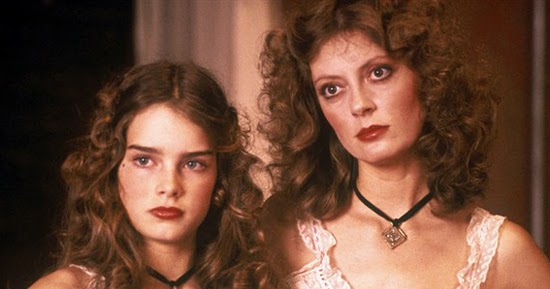![]()
Pretty Baby (1978) Directed by Louis Malle
It is all too convenient to condemn a work of art for its unequivocal controversy, just as it is all too easy to judge it with fallacies when inflammatory feelings do the talking instead of intellect and reason. Louis Malle’s contentious Pretty Baby has been subjected – with understandable reasons – to such ethical judgments from the day of its release in 1978 to the present day. The mere fact that the discussion has expanded to the present day only testifies to the transcendence of its controversy in the medium and in society; to state this is not tantamount to implying that it is a brilliant piece of cinema, yet it seduces you into thinking that it is, regardless of your moral values. Pretty Baby was the first American film by French auteur Louis Malle, who after the experience of making this film and living in the United States was fascinated by the American atmosphere and settled there developing a new period in his film career. The aesthetic tastefulness that stands out in the vivid period style of Pretty Baby has much to do with the Europeanism of Malle’s staging – throughout the film there is no doubt that the orchestrator, the man behind the scenes is a European – but the sensitive depth permeating the controversial scenario comes from the masterful screenplay written by Polly Platt; which is full of delicacy and roughness, not empathetic but not apathetic either, perhaps too ambivalent, but in its imperfections has an immaculate realism. The hostile debate that this film sparks has a lot to do with that realism. The film doesn’t fool on any level, its uncomfortable verisimilitude is so great that this production didn’t allow itself to hire a teenage girl or a grown-up girl with a childish face to play one of the most complex roles cinema has ever seen, that of a 12-year-old girl living in a brothel in 1917.
The decision, some might call it immoral, to cast an angelic 11-year-old to play the role is only a small part of the controversy. Brooke Shields was only 11 years old when she played Violet, at the time the only acting experience she had was a small role in the gialliesque horror film Alice, Sweet Alice (1976). Although she was practically a neophyte actress in front of Malle’s demanding camera, Brooke Shields fearlessly gives the performance of her life; easily the best child performance of the 70’s and objectively the finest performance of her career. Yes, her performance is mesmerizing, brimming with bravura and tragic eloquence, but this is when your moral principles start to judge the film for a myriad of reasons. First, innocent little Brooke Shields is subjected to many unsavory scenes in which she must pose nude. Second, Shields shares many scenes with mature men, whom she must kiss and be fondled. Third, the issues Shields’ character must deal with are extremely explicit for her premature age. These aforementioned points make the film divisive but above all it generates repudiation in a sector of the audience for obvious reasons. However, I believe one can legitimately feel that same repudiation while admiring this film; one thing does not change the other. Although my adulation for the film has more aesthetic than narrative leanings, the bold subject matter that dissects the plot is equally commendable when one surmises its goals. I really don’t think Pretty Baby would have been the same with a morally correct development, I remain incredulous about it. The only way to shock the audience is to convey with realistic severity a world so sleazy that it finally lays bare the worst of our society. In the latter Pretty Baby is a masterstroke.
The story takes us to the Storyville red-light district of New Orleans in 1917, during the last months of legal prostitution. An immodest, irresponsible young mother of two named Hattie (Susan Sarandon) is one of the prostitutes who work in a ritzy brothel run by Madame Nell (Frances Faye). Violet (Brooke Shields), Hattie’s 12-year-old daughter, grew up in the elegant brothel where her mother works in a promiscuous and inappropriate milieu. For Hattie it is entirely normal for her daughter to see her naked with other men or for some of the debauched men who come to the brothel to see her daughter with sexual desire. The narrative is self-explanatory thanks to the intuitive writing of Polly Platt, who always makes it abundantly clear that the maternal neglect stems from the same upbringing – it is very likely that Hattie grew up there too, so she has gone through exactly what her daughter is now experiencing, thus establishing an amoral scenario. Hattie’s life changes when one of her clients proposes to her, now that she has the possibility to quit prostitution, she decides to permanently leave New Orleans. Hattie abandons Violet at the brothel promising to come back for her once she tells her husband that she is in fact her daughter and not her sister (she always told him that Violet was her sister). But as her mother’s life changes, so does Violet’s life, albeit for the worse. Violet’s precocious inquisitiveness about the sordid world around her leads her to fall in love with a prostitute photographer named Ernest Bellocq (Keith Carradine). The relationship she develops with this character is at first friendly, then gradually turns into a revoltingly romantic one. Little Violet is unable to discern right from wrong; and the irony is that neither do the adult women who accompany her understand the level of depravity to which they enslave the helpless girl. Both the mood of the story and the performances exude a disturbing happiness. While we as the audience are disgusted by what we see, for the characters it is just another day at work, or another day being a woman or a child in Storyville.
The polemic that the audience encounters with the film is that both Malle and Platt deal with susceptible themes with naturalistic audacity, morality is nonexistent in the narrative, the lurid events are portrayed not as something horrendous or condemnable but as something normal and idyllic. However, there is an explanation for that, the psyche of the female characters is mainly formed under those amoral principles, therefore what for us is immoral for them is the opposite. For that very reason, Malle’s indelicate direction to evoke the emotional psychology of the characters is just as unpleasantly amoral, or neutral if one can use a more modest term. I see no other way in which Violet’s shattered innocence could have been expressed were it not for the literary and cinematic veracity that the film embodies. I am completely against the ways in which they used an 11-year-old girl for the sake of realism, but what is done is done. Whether it was wrong or not, the controversy should focus on the very physical and impactful depiction of child prostitution that even today is infamously prevalent. If the film made you uncomfortable or caused you indignation, I believe, that was the effect the filmmakers were going for; the ways in which they went about it may have been unethical, but the conclusions turn out to be paradoxically ethical. Ultimately, Pretty Baby will reverberate more dispute than consensus, but its shocking force is incontestable, whether you like it or not.

